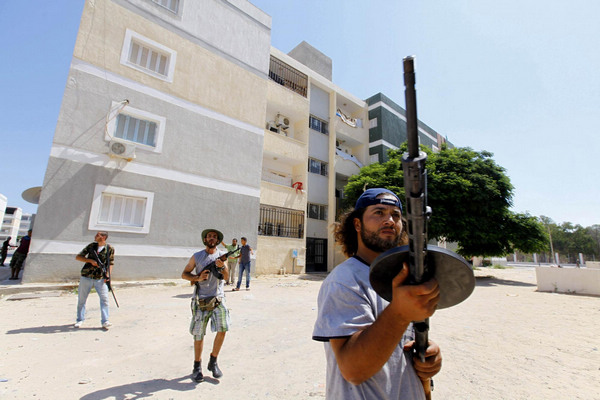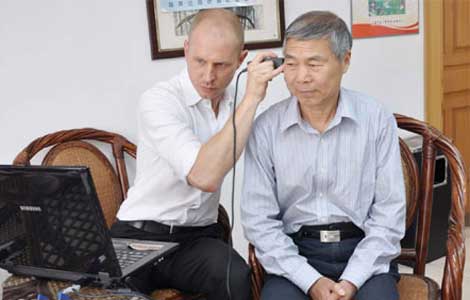Politics
UN to allow release of $1.5 bln frozen Libya funds
Updated: 2011-08-26 08:58
(Agencies)
|
 |
|
Rebel fighters scout for snipers in the final push to flush out Muammar Gadhafi's forces in Abu Salim in Tripoli August 25, 2011. Fierce fighting erupted in central Tripoli on Thursday, with heavy exchanges of machinegun fire between rebel forces and soldiers loyal to deposed Libyan leader Muammar Gadhafi, a Reuters correspondent reported. [Photo/Agencies] |
UNITED NATIONS - The United States and South Africa struck a deal on Thursday to allow the release of $1.5 billion in frozen Libya funds for humanitarian aid and other civilian needs, UN diplomats said on Thursday.
They said the agreement would allow the release of the funds without a Security Council vote on a draft resolution that Washington submitted on Wednesday after South Africa blocked a US request to disburse the money in the UN Libya sanctions committee.
The South African delegation said it did not support funds going directly to the Libyan rebel government, the Transitional National Council (TNC), which the African Union has not recognized. Pretoria insisted that there be no mention of the TNC in the official request for the release of the funds.
US Deputy UN Ambassador Rosemary DiCarlo told reporters the South Africans "are lifting their hold now."
"The council has reached consensus on the package of $1.5 billion in assets that we want unfrozen," she said, adding that the United States was "very pleased with the outcome."
A spokeswoman for the South African UN mission, however, said her delegation had told the United States that Pretoria would withdraw its objection to the release of the money "as long as there is no reference whatsoever to ... the TNC."
"Because if it's TNC, then it means that we are agreeing as the 15 collective council members to say yes to the TNC and we have not all recognized it," she told reporters.
No tacit recognition
Diplomats said the TNC would be involved in deciding how to use the money, even though the request no longer refers to the TNC specifically but to the "relevant Libyan authorities."
"The funds will go to the relevant authorities in Libya, and the relevant authorities happen to be the TNC," DiCarlo said.
South African Ambassador Baso Sangqu made clear that he was satisfied: "The question of recognition, of any tacit recognition through this request, has been dropped."
Another diplomat told reporters that the US delegation had agreed to reword its Aug. 8 request to the sanctions committee, enabling the South African delegation to back the release of the funds. UN sanctions committees make decisions by consensus, which means each council member has a veto.
The unfreezing of the funds became official shortly after the Security Council meeting, diplomats said.
The original request to release the $1.5 billion had explicitly called for the TNC to play a role in deciding how some of the money would be used, which was what South Africa insisted be removed from the request.
The US request had said the money, currently frozen by the US government on the basis of UN sanctions adopted this year, was not to be used for military purposes.
The $1.5 billion is expected to be split into three $500 million tranches to pay for humanitarian relief by UN agencies, for civilian power and for health, education and food, the US State Department said.
Of the first tranche, $120 million would reimburse UN agencies such as the World Food Program and the UN High Commissioner for Refugees already in Libya. The remaining $380 million would be held in reserve for such UN agencies.
The second $500 million would pay for civilian power such as electricity and for desalination. The final $500 million would go into a temporary funding mechanism set up by the rebels and would be dedicated to health, education and food.
E-paper

Blue economy gets a lift
Coastal areas of Shandong, Zhejiang and Guangdong to spearhead sector development.
The light touch
Long way to go
Outdoor success
Specials

Star journalist remembered
Friends, colleagues attended a memorial service to pay tribute to veteran reporter Li Xing in US.

Hot pots
Tea-making treasures catch the fancy of connoisseurs as record prices brew up interest

Hear we go
Polish Audiologist helps thousands of Chinese hear for the first time.
